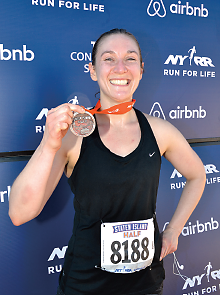Resident Runs for the Foundation
Abstract
Resident-Fellow Member Trustee Lara Cox, M.D., M.S., combines her love of running with her desire to inform people about the good work of the American Psychiatric Foundation.
Like many young psychiatry trainees, Lara Cox, M.D., M.S.—APA’s Resident-Fellow Member (RFM) trustee—has faced the multiple challenges of maintaining a balance between her studies, organizational activities, and home life.

APA’s RFM Trustee Lara Cox, M.C., M.S., is using her passion for running as a means to raise awareness of the American Psychiatric Foundation and its programs.
As someone who has had a strong desire for a career in psychiatry since high school, the work side of the equation has been especially strong in Cox’s case. And while APA has certainly benefited from her commitment to the field—she has been active in the psychiatry advocacy community since she attended a PsychSIGN conference during her first year of medical school at the University of Pittsburgh—some nonprofessional activities did take a back seat.
“I started trying to become a serious runner when I was in medical school, because I enjoyed it and it was good for my health” she said. “But I’m the type of person where doing something just for me tends to be last on my list.”
After starting her residency at New York University, however, Cox had an inspiration. “I realized if I started running for a cause, I would commit to it more.”
And for Cox, the obvious cause was the American Psychiatric Foundation (APF).
“The APF is doing great work, with programs like ‘Typical or Troubled?’ and the Judges Leadership Initiative, but it doesn’t get the recognition it deserves,” she said. “By running for the foundation, I could help get the word out in a nontraditional way and maybe narrow that communication gap.”
Having already competed in a few charity races, Cox has set an ambitious goal for 2015— completing a long-distance race in each of the five New York boroughs. She also hopes to get other psychiatry residents and fellows in the New York area involved as well, through networking at local events and hoping the message then gets spread by word of mouth. “If we can get a strong group involved, we could raise a tremendous amount of money and awareness” for the work of the APF, she said.
In the longer term, Cox would like the APF to establish an official affiliation with a major race, which would help raise the foundation’s public profile even more.
“Dr. Cox is an extraordinary person who has combined her professional passion with a runner’s dedication to advocacy and philanthropy. The American Psychiatric Foundation is proud to count Dr. Cox as a supporter and a friend,” said Paul Burke, executive director of the APF.
Cox said she also wants to encourage anyone who might be interested in supporting a charity or group through some activity to give it a try, as it doesn’t take much effort to get started. All it takes is setting up a peer-to-peer fundraising account, of which there are many to choose from these days, and then letting friends, family, and colleagues know via local connections or social media. (Cox provides many charity updates through her Twitter account, @DrLaraCox.)
Eventually, those small steps may burgeon into a major movement, but even if they don’t, one shouldn’t be disappointed, she emphasized. “At the end of the day, you’ve combined an activity you enjoy doing with a cause you care about, which is a true example of creating a work-life balance.” ■



